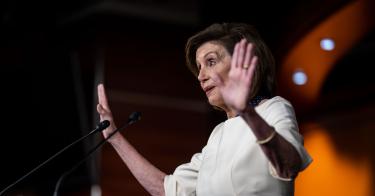Last weekend, the House finally passed the nearly $1.2 trillion infrastructure package. The vote followed months of tedious back-and-forth drama between various factions within the Democratic Party.
Ideally, that would be the final act in an overly long spending spree from Congress that began last year, but there’s an all-too-real chance the worst is yet to come.
Self-interested lobbying groups have portrayed the infrastructure bill as an “investment” to help the economy. Unfortunately, the poorly crafted package will waste taxpayer money in a variety of ways:
- Using a mix of budget gimmicks and adding to the already sky-high national debt to “pay” for the spending hike.
- Increasing subsidies for mass transit, which is already heavily subsidized, and which has faced a ridership crash since the start of the COVID-19 pandemic. With a long-term increase in telework reducing the amount of commuting to urban cores, this is the worst possible time to throw more money at transit (unless you’re a unionized transit worker).
- Injecting left-wing priorities and social justice concepts into transportation law. The bill repeatedly cites a goal of “equity,” funds “traffic calming” projects that increase congestion, and will even subsidize broadband internet service for prisoners.
- Further empowering bureaucrats in Washington to control infrastructure projects across the country. Because federally funded projects come with reams of cost-increasing red tape, we end up with less bang for our buck as control shifts from the state and local level to the feds.
Amazingly, that was the fourth mega-spending bill to pass in just the past 20 months, each of which had a fiscal impact in line with (or larger than) the first decade of Obamacare.
- The March 2020 CARES Act, which authorized more than $2 trillion, funded a large initial response to the pandemic, including business loans and safety net programs. However, the rush to produce the legislation led to mistakes, including plus-sized unemployment checks that meant many people made more money staying home than if they had a job.
- The December 2020 Response and Relief Act spent $900 billion in a way that was almost completely divorced from reality. While COVID-19 was reaching its all-time peak, the spending was focused on economic and governmental stimulus, rather than public health, despite the economy having already stabilized. There were unnecessary handouts to public schools and politically connected industries, along with a continuation of the counterproductive unemployment benefit bonus.
- The $1.9 trillion American Rescue Plan from March 2021 opportunistically used the pandemic as an excuse to throw money at political special interests. Even more cash for public schools did nothing to speed up reopening, and bailouts for unionized industries had nothing to do with COVID-19. Worse, the combination of excessive stimulus and anti-work welfare expansions helped set the stage for the economic problems we’re seeing today.
One would hope that throwing trillions of dollars of hard-earned money around and running up the national debt to $28.9 trillion (or more than $220,000 per household) would be enough to satisfy the progressive left.
But they aren’t stopping, or even slowing down. House Democrats have crafted the biggest spending package yet, and even have the audacity to claim that it’s a compromise.
While they claim it would “only” cost $1.75 trillion, the real cost is much higher. The centrist Committee for a Responsible Federal Budget estimates the cost at $2.4 trillion.
But that’s just the tip of the iceberg.
The spending is front-loaded in the first few years, while relying on a full 10 years of tax increases to (partially) pay for it. And with an astonishing collection of gimmicks designed to obscure the cost of new programs and entitlements, the real cost over a decade would be between $4.5 trillion and $5 trillion.
What would Democrats get for such an obscene amount of money?
Tax breaks for high-income households in blue states; mass amnesty for illegal immigrants; a super-sized welfare state, discouraging work; price controls that would damage medicinal innovation; Green New Deal items like “environmental justice” college programs and “tree equity”; an array of anti-investment tax hikes; and much more.
America already can’t afford the government we have today. Important programs such as Social Security and Medicare are rapidly going bankrupt, and even record-high tax revenues aren’t coming close to keeping pace with the spendthrifts in Congress.
Rather than creating new programs to deepen the D.C. swamp and empowering federal bureaucrats to dictate where our money goes and how we live our lives more than they already do, Congress should pump the brakes as rapidly as possible.
It’s not too late for legislators to step back from the cliff’s edge and learn how to live within their means.
That would involve ensuring that existing programs are on firm footing; focusing the federal government on core priorities by eliminating wasteful boondoggles throughout the budget and tax code; and improving the economy by getting government out of the way, rather than offering new flavors of corporate welfare.
The first step would be to take a pass on the profoundly radical social spending package that House Speaker Nancy Pelosi, D-Calif., wants to stuff down our throats before Thanksgiving.
This piece originally appeared in The Daily Signal



